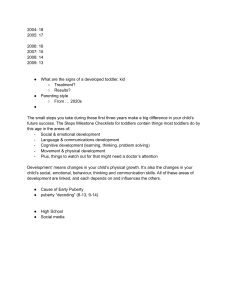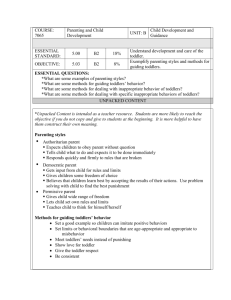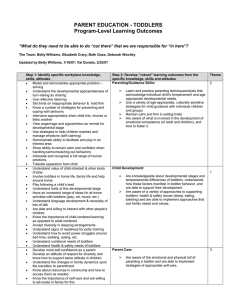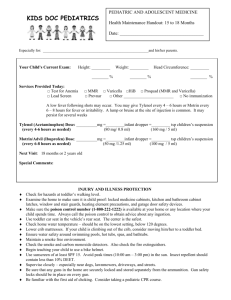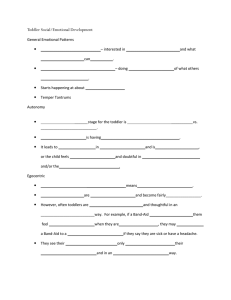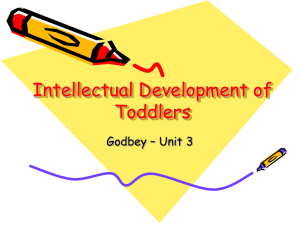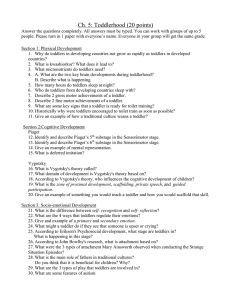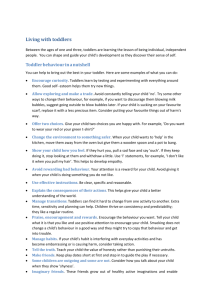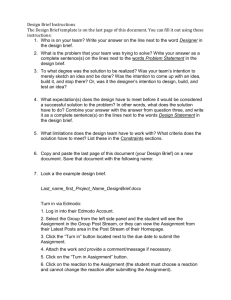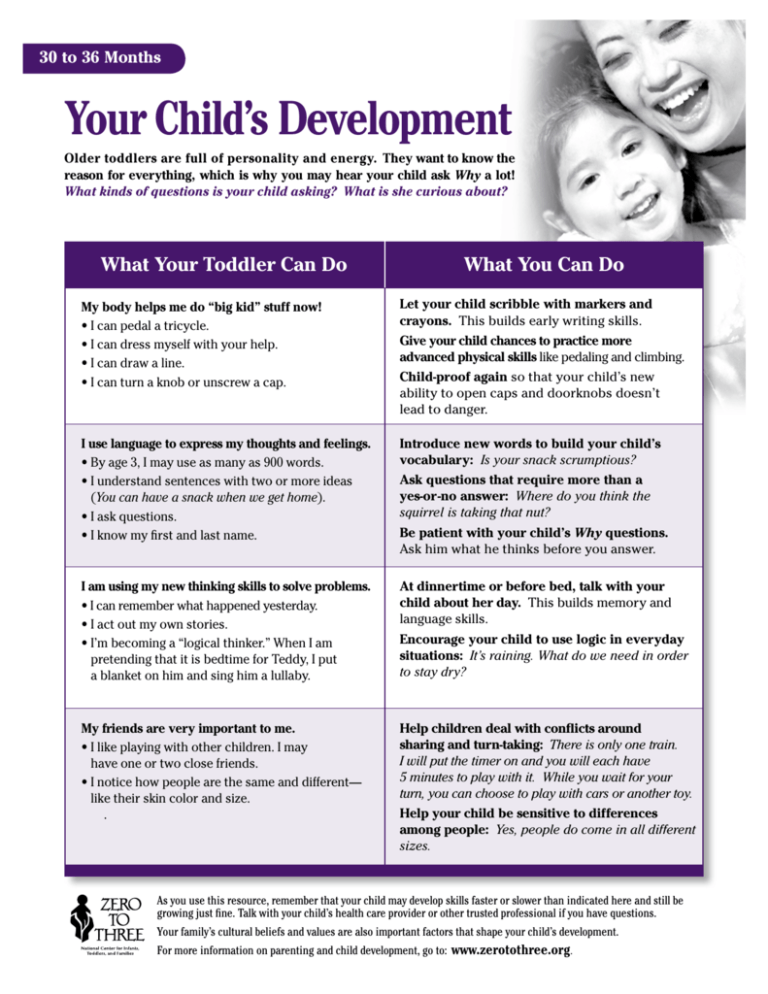
30 to 36 Months
Your Child’s Development
Older toddlers are full of personality and energy. They want to know the
reason for everything, which is why you may hear your child ask Why a lot!
What kinds of questions is your child asking? What is she curious about?
What Your Toddler Can Do
What You Can Do
My body helps me do “big kid” stuff now!
• I can pedal a tricycle.
• I can dress myself with your help.
• I can draw a line.
• I can turn a knob or unscrew a cap.
et your child scribble with markers and
L
crayons. This builds early writing skills.
I use language to express my thoughts and feelings.
• By age 3, I may use as many as 900 words.
• I understand sentences with two or more ideas
(You can have a snack when we get home).
• I ask questions.
• I know my first and last name.
Introduce new words to build your child’s
vocabulary: Is your snack scrumptious?
I am using my new thinking skills to solve problems.
• I can remember what happened yesterday.
• I act out my own stories.
• I’m becoming a “logical thinker.” When I am
pretending that it is bedtime for Teddy, I put
a blanket on him and sing him a lullaby.
t dinnertime or before bed, talk with your
A
child about her day. This builds memory and
language skills.
My friends are very important to me.
• I like playing with other children. I may
have one or two close friends.
• I notice how people are the same and different—
like their skin color and size.
.
Help children deal with conflicts around
sharing and turn-taking: There is only one train.
I will put the timer on and you will each have
5 minutes to play with it. While you wait for your
turn, you can choose to play with cars or another toy.
Give your child chances to practice more
advanced physical skills like pedaling and climbing.
hild-proof again so that your child’s new
C
ability to open caps and doorknobs doesn’t
lead to danger.
Ask questions that require more than a
yes-or-no answer: Where do you think the
squirrel is taking that nut?
Be patient with your child’s Why questions.
Ask him what he thinks before you answer.
ncourage your child to use logic in everyday
E
situations: It’s raining. What do we need in order
to stay dry?
Help your child be sensitive to differences
among people: Yes, people do come in all different
sizes.
As you use this resource, remember that your child may develop skills faster or slower than indicated here and still be
growing just fine. Talk with your child’s health care provider or other trusted professional if you have questions.
Your family’s cultural beliefs and values are also important factors that shape your child’s development.
For more information on parenting and child development, go to: www.zerotothree.org.
?
Your Child’s Development
Spotlight on Making Friends
30 to 36 Months
What’s on Your Mind
My 33-month-old son has such an
imagination. He wants me to call
him “King Diego” and he spends
all his time building castles with
his blocks. Should I be worried?
Playing pretend is very
common for older toddlers and
preschoolers, which is a really
good thing. Why? Because using
their imaginations helps young
children develop their thinking,
language, and social skills as they
talk about and think through how
their story should unfold. By
taking on different roles, your son
is also learning to see the world
from another person’s point of
view. By acting out stories, he is
learning how to solve problems
like how to build the block castle
so it won’t fall down. Long story
short, there is no need to worry
and actually many reasons to
celebrate King Diego. So take
a moment to get down on the
floor with your son and ask what
part you can act out—Queen?
Soldier? Horse? You’ll be having
fun together and helping your son
learn at the same time.
Between 30 and 36 months, toddlers really enjoy playing with
friends—doing things like acting out stories, building together with
blocks, or exploring the playground.
Friendships are great fun. They also help children develop important
social skills like taking turns, sharing, and helping others.1 Through
friendships, children learn to communicate with others, resolve disagreements, and understand others’ thoughts and feelings.2 Children who are
friendly, confident, and who can cooperate with others are most likely to
succeed in a classroom setting.
Keep in mind that brothers and sisters are often a child’s first friends,
even though it may not seem like it some days! Sibling relationships
provide daily practice with sharing and cooperating. They also offer
children opportunities to show compassion and loving support.
What You Can Do
Make time for play. Encourage
brothers, sisters, and cousins
to play together. Organize playdates with friends. Join a parenting group or attend community
events like library story hours.
Give nonverbal feedback. Give
your child an encouraging smile
when he is unsure about sharing.
otice positive behavior. You
N
two figured out how to share the
trains. Nice job!
Help children understand others’
feelings. Janelle is covering her
face. She doesn’t like it when you
throw the ball so hard. Let’s roll it
gently instead.
ncourage children to problemE
solve. You both want the tricycle.
What can we do about this?
Suggest problem-solving
strategies. How about while
Marco has a turn on the tricycle,
you pretend to be the traffic light
and say “stop” and “go?” Then
you two can switch.
What can you do to help
your child learn to be a
good friend?
Did You Know…
The more television 3-year-olds watch each week, the more they ask for the foods
they have seen advertised.3
What It Means for You:
Young children are influenced by what they see
on television. So limit your child’s TV time and
try to avoid shows with advertisements. Make
sure that what she does watch is right for
Authors: Rebecca Parlakian and
Claire Lerner, LCSW, ZERO TO THREE
her age. And begin teaching your toddler
good eating habits by offering healthy meals
and snacks. You can also be a role model by
eating healthy yourself. Most importantly,
keep the whole family active by making time
for active play every day.
This handout was made possible
by a generous grant from
www.zerotothree.org
Endorsed by:
Copyright 2008 ZERO TO THREE
All rights reserved.
Printed in the United States of America.
ISBN 978-1-934019-28-3
1 - Kemple, K. M., 2004
2 - Gurian, A., & Pope, A. in www.aboutourkids.org
3 - Taras, H., Sallis, J., Patterson, T., & Nader, P., &
Nelson, J., 1989.
Photo credit: Eyewire/Parenting Today/Getty Images

